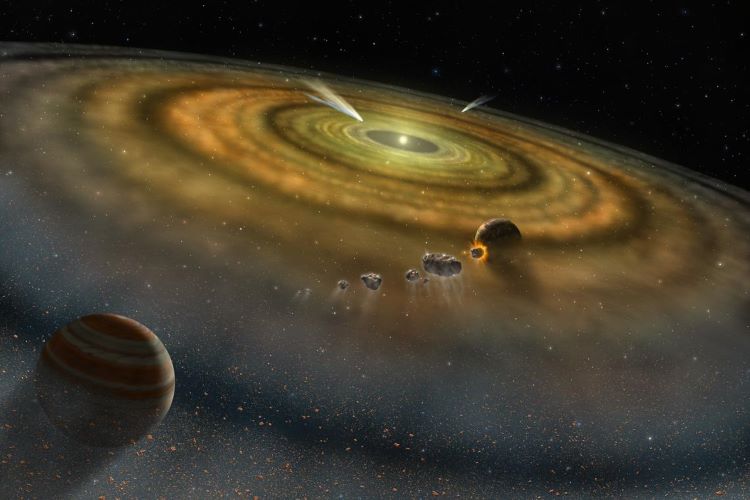Universe Today has engaged in insightful discussions with researchers on the significance of exploring various scientific fields like cosmochemistry, astronomy, and planetary science to deepen our understanding of the quest for extraterrestrial life. This article delves into the realm of cosmochemistry, shedding light on its importance, benefits, challenges, and its role in unraveling the mysteries of our solar system and beyond.
Cosmochemistry, as described by an associate professor of physics at Washington University in St. Louis, involves the study of celestial materials such as planets, stars, comets, and asteroids, encompassing various forms of matter like solid, liquid, gas, and plasma. Distinct from astronomy, which focuses on light interactions with these materials, cosmochemistry offers two key advantages: it provides insights into the past conditions of material formation and enables precise laboratory measurements that advance with technological advancements.
The essence of cosmochemistry, also known as chemical cosmology, resonates with Carl Sagan’s iconic quote, emphasizing that we are interconnected with the cosmos through the elements we are composed of. Understanding cosmochemistry unveils the origins of Earth, humanity, and potentially the pathways to discovering life beyond our planet.
This scientific discipline employs diverse methodologies to address fundamental inquiries about the creation of celestial bodies throughout the universe. By analyzing meteorites and physical samples from space missions, researchers gain valuable insights into the formation processes of stars and planets. The meticulous nature of laboratory analyses in cosmochemistry allows for reproducible measurements, a crucial aspect often challenging in astronomical studies and remote sensing observations.
While sample return missions from space involve meticulous planning and execution, they offer invaluable opportunities to study extraterrestrial materials on Earth. Various countries have successfully conducted sample return missions from celestial bodies like the Moon, asteroids, comets, and even solar particles, providing essential data for cosmochemical investigations.
The potential implications of cosmochemistry extend to understanding the delivery of life-building components to planets through asteroids and comets. By studying primitive organic compounds in asteroid and comet materials, researchers explore plausible scenarios for the origins of life on Earth and other worlds. The quest for detecting life beyond Earth underscores the significance of meticulous laboratory analyses and collaborative efforts across scientific disciplines.
NASA’s Mars Sample Return (MSR) mission exemplifies ongoing endeavors to retrieve Martian regolith samples for detailed analysis on Earth. While discussions on sample return missions from moons like Europa and Enceladus continue, challenges related to the vast distances and complexities of such missions persist.
A pivotal achievement in cosmochemistry was the analysis of oxygen isotopic composition in the solar wind, despite challenges faced during the Genesis mission. This groundbreaking research highlighted the interconnectedness of the Solar System’s elements and their alignment with ancient cosmic objects, underscoring the field’s astrophysical relevance.
In conclusion, cosmochemistry stands as a captivating and multidisciplinary field that invites aspiring students to explore diverse scientific domains like biology, chemistry, geology, physics, and mathematics. The intricate nature of cosmochemical research offers a blend of challenges and rewards in unraveling the mysteries of celestial bodies and the origins of life. Meteorites, as captivating records of natural history, provide tangible connections to distant worlds, inspiring curiosity and scientific exploration.
As we continue to delve deeper into cosmochemistry, the coming years hold promise for unveiling further insights into our cosmic origins and the potential for life beyond Earth. The pursuit of science remains a beacon guiding us to new discoveries and a deeper understanding of our place in the vast expanse of the universe.
